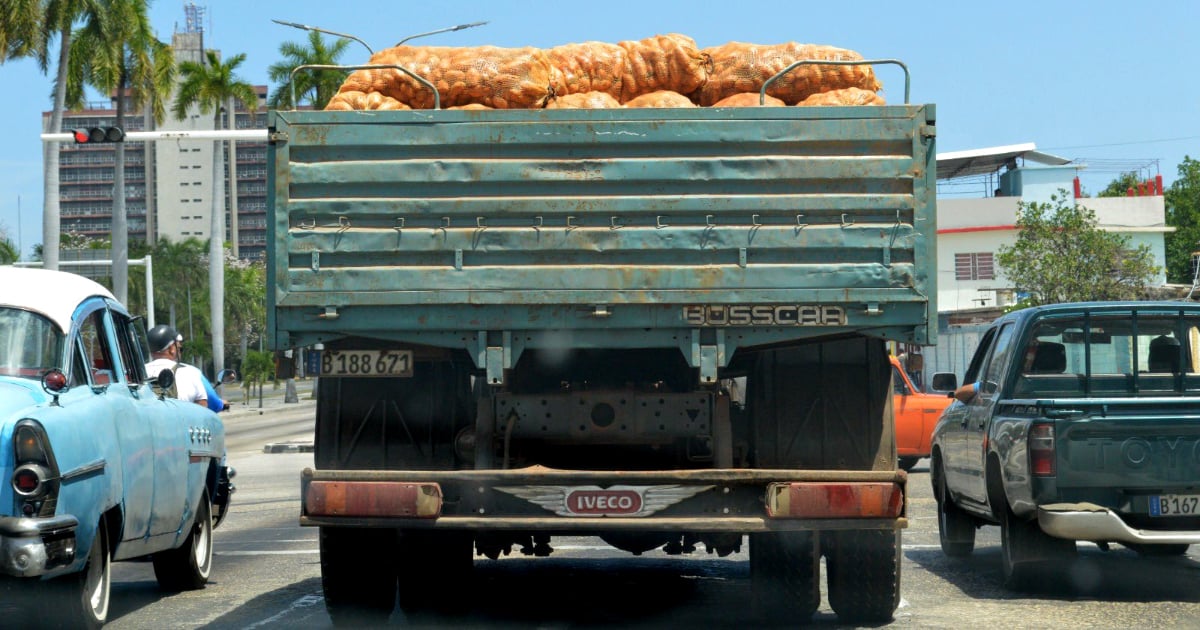Potatoes, an essential food item in the Cuban diet, have become a scarce commodity throughout the year. This tuber, highly demanded by the population, is only formally available through the ration book in small quantities and with variable quality during the harvest season.
The state distribution system, micro, small, and medium enterprises (Mipymes), self-employed individuals, and the black market are the economic players involved. However, it is in the latter where the supply of potatoes is more consistent, albeit at prices that are prohibitive for the average Cuban worker.
In the black market, a pound of potatoes is priced between 150 and 200 pesos, depending on its quality. There are several ways to acquire them: by order, made through social media with home delivery for an additional cost, or through street vendors who operate under the constant risk of being caught by the police or inspectors, which could result in severe fines.
An analysis published by the non-governmental organization Food Monitor Program questioned where the potatoes sold in the black market come from if the state is the only entity authorized to import, produce, and commercialize them in the country.
Corruption and Resource Diversion in Potato Distribution
The answer lies in a complex network of corruption and resource diversion involving various actors within the state distribution system, the NGO stated in an article published on its website this Tuesday.
Potatoes in Cuba have two origins: importation and domestic production, both strictly controlled by the state. However, once the tuber enters the national distribution network, a corruption network that spans the entire country is activated.
Warehouse workers, transporters, operators of state-run marketplaces, and ordinary citizens are part of this corrupt network. The natural spoilage of the product is used as an excuse to justify the tons of potatoes that disappear in the distribution chain.
From large wholesale warehouses to community marketplaces, resource diversion is frequent. Potato sacks are diverted and sold illegally to stevedores and drivers during transport.
In the local marketplaces, administrators prefer to receive deliveries on Saturday afternoons to exploit the corruption, as they are closed on Sundays, and on Mondays, they justify the spoilage with bad potatoes, allowing for the illegal sale of the remaining sacks.
Retail resellers are the last link in this corruption chain. These individuals, trained in years of illegal business, have the necessary contacts to ensure a steady supply of potatoes. They operate in local marketplaces and some state-run points, selling the potatoes in their homes or through home delivery via social media. The most powerful ones have distributors who sell the product in small quantities at exorbitant prices.
The biggest loser is the ordinary citizen, who cannot access potatoes at affordable prices. Beyond individual and institutional responsibilities, the root of the problem lies in collectivist agri-food policies and the lack of incentives for food production in Cuba.
The totalitarian system has no effective answers to these problems, as a true economic opening would undermine its own sociopolitical foundations. Hunger and scarcity in Cuba have become everyday phenomena, making evident the need for structural change to solve this food crisis.
The Food Monitor Program considers it evident that the right to food has been used as an instrument of domination in Cuba since the introduction of the ration book in March 1962.
Assuming that greater state-party intervention eliminated citizens' agency, transformed their eating practices, controlled their time, and managed their private lives, its experts point out that the promise of the so-called “revolution” to guarantee social and economic rights like food was paid for with the subtraction of civil and political rights.
The Food Monitor Program aims to deconstruct the myth of food sovereignty in Cuba, dismantling the justifications of the blockade and evidencing its political instrumentalization. Additionally, it seeks to contribute to preventing these models from being promoted in the region and serving as a way to dismantle democracy and the rule of law.
Understanding the Potato Crisis in Cuba
Here are some frequently asked questions and answers about the potato crisis in Cuba, shedding light on the complex issues surrounding this essential commodity.
Why are potatoes scarce in Cuba?
Potatoes are scarce due to a combination of strict state control over production and importation, corruption, and resource diversion within the distribution network.
How much do potatoes cost on the black market?
On the black market, a pound of potatoes can cost between 150 and 200 pesos, depending on their quality.
Who are involved in the corruption network?
The corruption network involves warehouse workers, transporters, operators of state-run marketplaces, and ordinary citizens.
What is the role of the Food Monitor Program in this issue?
The Food Monitor Program aims to deconstruct the myth of food sovereignty in Cuba, expose the political instrumentalization of the blockade, and prevent the promotion of these models in the region.
